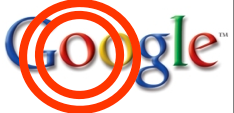
Google may be having its share of recessionary stumbles, but compared to most of techdom it’s still smooth sailing over in Mountain View. And apparently that’s enough to make everyone want to sue. Three potential legal threats are looming in the news today around Google: One deemed a non-issue, another that should be deemed a non-issue, and one a very serious and troubling issue.
Let’s look at them in order of most frivolous first. Remember the Pennsylvania couple who sued Google last spring for taking pictures of its house and posting them on Google Street View? The aptly named case, Boring v. Google, has been handily dismissed. The courts wisely struck down the idea that Google was compromising the couple’s privacy since, ahem, they launched a suit calling more attention to their house than an obscure picture on Google Street View ever would have in the first place. It also said the trucks driving by weren’t enough to be considered trespassing, threw out the idea that the whole thing had caused emotional distress, and just generally told the Borings to get a life. Score one for justice and capitalism working hand-in-hand.
But today Google has to contend with a new case that’s almost as absurd. TradeComet, which already complained to the New York Times that Google is upping its advertising rates unfairly, is now suing Google for antitrust. Here’s the gist of the complaint: TradeComet’s SourceTool.com is basically a middleman-site that aims to connect searchers with the businesses they are looking for by showing them search ads and directory listings. The press release says repeatedly that Google was supportive of SourceTool until the site got too powerful and became a clear “competitive threat” to Google. Now Google is using its monopolist power to run TradeComet—which plows some 80% of its profits back into Google ads—out of business.
Let’s count all the things wrong with that argument, starting with the obvious: Google may be a lot of things but modest isn’t one of them. The company isn’t even worried about Microsoft when it comes to search. It’s certainly not viewing SourceTool as a competitive threat, especially if the company is plowing 80% of its revenues back into Google keywords. That’s inane.
Second, Google’s bread-and-butter is helping searchers find what they’re looking for in one-click. My guess is someone coming to Google and entering the name of a business is looking for that business, not another search engine that will give you another list of results no matter how “specialized” it is. Google is right to use market pressures to make the end user experience better and make life harder for the useless middlemen.
Third, no one is forcing SourceTool to rely so heavily on Google for its business. Startup 101 dictates that you never want to be 100% reliant on a potentially competitive company for your business. If SourceTool is that reliant on Google keywords for traffic, perhaps it’s a sign that it hasn’t built something that useful. News flash to TradeComet: You can’t sue your way to a good product or a thriving business. Just ask SCO, that Salt Lake City company that claimed to own Linux and was last heard from filing Chapter 11.
But as absurd as the complaint is, Google has to take this seriously. Why? Eric Schmidt’s BFF President Barack Obama. Even before he took office, the Justice Department said it would block Google’s proposed ad search deal with Yahoo, citing the company’s more than 70% market share in search advertising. And now, things look worse. Christine A. Varney has been nominated as Obama’s choice to head the Justice Department’s antitrust division. The same Christine A. Varney who several months ago said, “For me, Microsoft is so last century. They are not the problem.” The new threat? Google, a company that Varney said has “acquired a monopoly in Internet online advertising.” Would that Google-DoubleClick deal have slid through under Varney? Doubtful.
I wasn’t at the conference where Varney reportedly said this, but my concern is the government loves to scapegoat in a downturn and that quote reads like an anti-trust wonk scanning tech for a new target. The debate over whether you can have a “monopoly” on the Internet the way you can on a desktop is still raging throughout the Valley, and I come down somewhere in the middle of Google saying it’s a fluffy, little, do-no-evil bunny no one needs to worry about and fear-mongers who say Google is going to hijack the Internet. Google needs to be watched certainly. But there’s a big difference between a writer like me having to use Microsoft Word because it’s installed on every desktop and its the program all my various editors also use, and me voluntarily going to Google each and every time I want to conduct a search. There’s nothing compelling me to pick Google over-and-over again; it’s just a better search engine. In today’s world of glitchy software and unreliable betas, let’s not punish a site that has market power simply because it works.